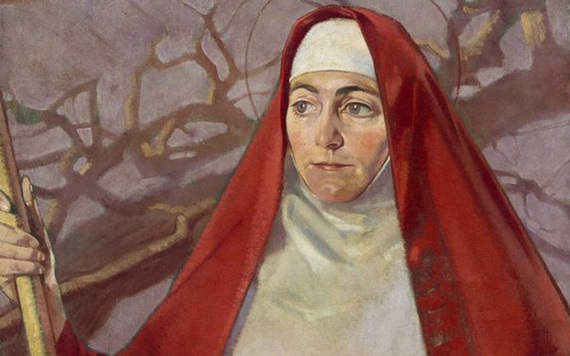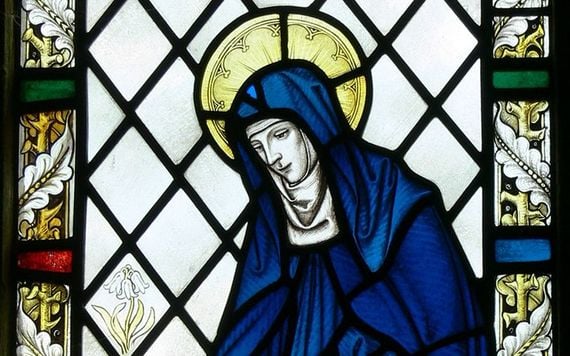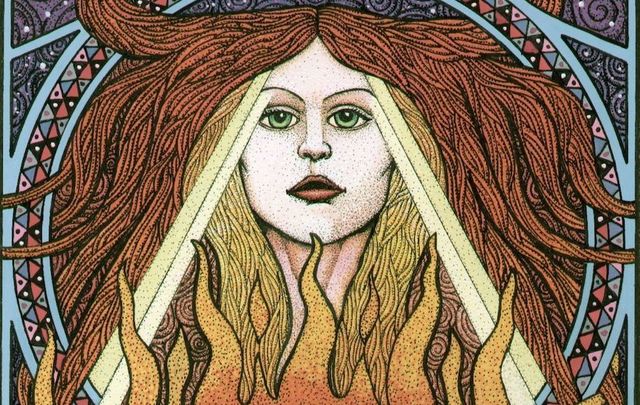Herstory launches campaign to make St. Brigid's Day a national holiday, ahead of Feb 1, marking the beginning of spring and the Celtic festival of Imbolc.
Herstory, a movement that aims to write women back into Ireland's history, has launched a campaign to make Feb 1, St. Brigid's Day a national holiday. Once upon a time, this date was celebrated by the Celtic people as the festival of Imbolc, dedicated to the goddess of fire, who we now call St. Brigid.
Read more: Celebrating strong Irish women for St. Brigid’s Day
To reignite this epic ritual, the Herstory Light Festival will take place over the weekend of Brigid’s Day 2020, in Dublin. Herstory states on their site "It is time we celebrated Ireland’s triple goddess and matron Saint equally to our world-renowned patron Saint Patrick."
As well as celebrating the Celtic goddess through light displays, Herstory has launched a petition which will be presented to Ireland's Minister for Business, Enterprise, Innovation, Heather Humphries, to start the process to make St. Brigid's Day a national holiday.
You can view and sign the petition here.

Saint Brigid.
As well as dubbing St. Brigid the Matron Saint of Ireland, and being a celebration of the women of Ireland celebrating Brigid's Day "would be a reflection of the progressive, modern Ireland we live in today."
Herstory writes:
Brigid is a triple goddess – the goddess of healing symbolized by the element of water, goddess of the alchemical force of fire, and goddess of poetry. In this respect, she represents every woman and our unique talents, skills, and qualities. Too often we put ourselves in boxes, limited by cultural stereotypes in an effort to fit in. Brigid urges you to develop and express all your gifts.
Read more: Roots of St. Brigid and how to make her iconic cross
Brigid embodies mastery represented in the perfect balance of fire and water, symbols of the masculine and feminine, known in Eastern traditions as the yin and yang or ida and pingala. As we strive for equality today, Brigid reminds us that we must also heal our inner feminine and masculine. As within so without, as above so below.
“The goddess Brigid is a bridge, crossing the threshold from pagan to Christian, winter and spring, water and fire, masculine and feminine,” reveals Treacy O’ Connor.
She is a reminder that duality and separation are illusions. Unity and harmony are our true nature.
A stained-glass window depicting St. Brigid.
Ancient legend, modern icon
There’s much more to Saint Brigid than the legend of her ever-expanding cloak and the iconic woven cross.
“Saint Brigid was the daughter of a druid and she had a lot of qualities of a goddess. The qualities of the goddess represent Christianity, the good qualities like compassion and love of animals and care of people. She was that person who was both the Christian Saint and she brought the goddess culture.” - Dr. Máirín Ní Nualláin.
Legend has it her father wanted to marry her off but she decided to devote her life to compassionate care of the poor and animals, so she pulled out one of eyes to destroy her beauty. Whatever about her outer beauty being tarnished, her inner beauty continued to grow, illuminating every heart lucky enough to encounter her. The legends spread of miracle healings, taming of wild animals, and turning water to ale.
In The Life of Brigid, Cogitosus reveals that Brigid was a born leader who charismatically persuaded the Christian hermit Conleth to abandon his life of solitude and join her to form a ‘mutually happy alliance’ and govern the Kildare community. He was the bishop and she was the abbess, and together they created a double monastery from the Early Christian tradition. Within 100 years of her death, there was a thriving egalitarian monastery of men and women, living and practicing equally, side-by-side.
Ireland’s matron saint is our first recorded abortionist, ‘restoring a nun’s chastity’, as recorded in The Annals. She was also a lesbian, ‘sharing her bed with a woman.’ Brigid may be an anomaly for Catholicism but one thing is for sure, she represents true Christianity. In the 21st century, she reemerged as a fitting heroine of the Marriage Equality and Repeal the 8th referendums - both extraordinary victories of compassion.
Making Brigid’s Day a national holiday would be a reflection of the progressive, modern Ireland we live in today.
What do you think? Read more about the petition and Herstory project here.
Read more: Everything you need to know about St. Brigid, Ireland's female patron saint




Comments